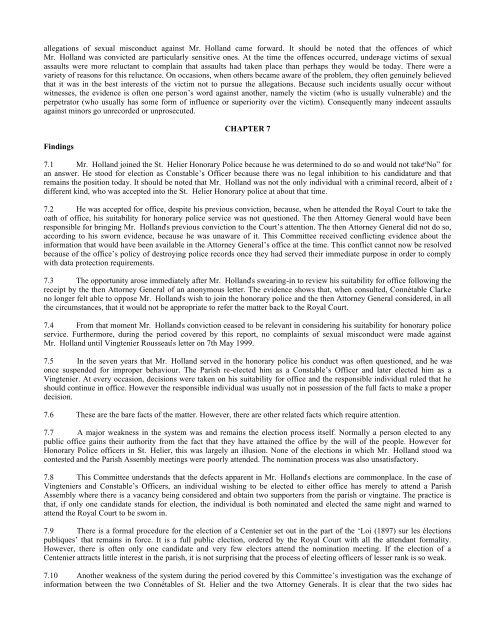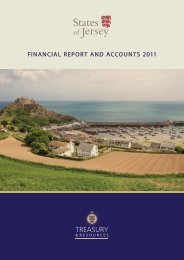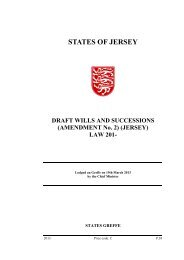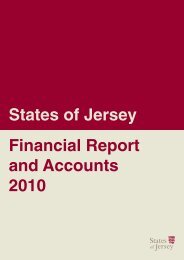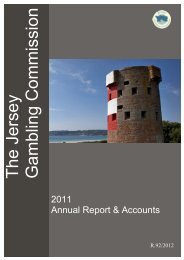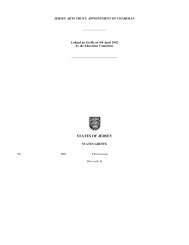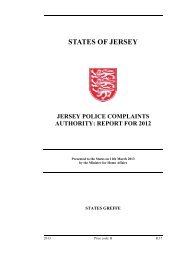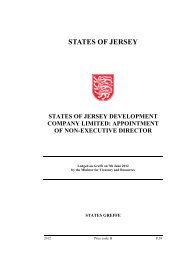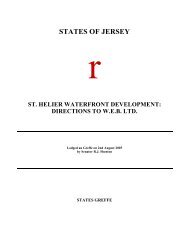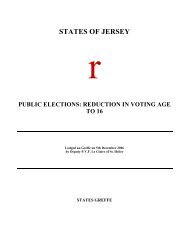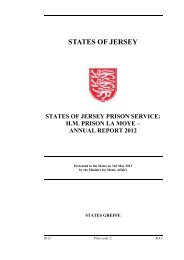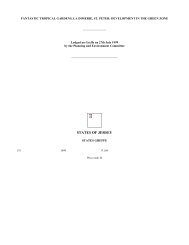report - States Assembly
report - States Assembly
report - States Assembly
- No tags were found...
Create successful ePaper yourself
Turn your PDF publications into a flip-book with our unique Google optimized e-Paper software.
allegations of sexual misconduct against Mr. Holland came forward. It should be noted that the offences of whichMr. Holland was convicted are particularly sensitive ones. At the time the offences occurred, under-age victims of sexualassaults were more reluctant to complain that assaults had taken place than perhaps they would be today. There were avariety of reasons for this reluctance. On occasions, when others became aware of the problem, they often genuinely believedthat it was in the best interests of the victim not to pursue the allegations. Because such incidents usually occur withoutwitnesses, the evidence is often one person’s word against another, namely the victim (who is usually vulnerable) and theperpetrator (who usually has some form of influence or superiority over the victim). Consequently many indecent assaultsagainst minors go unrecorded or unprosecuted.FindingsCHAPTER 77.1 Mr. Holland joined the St. Helier Honorary Police because he was determined to do so and would not take“No” foran answer. He stood for election as Constable’s Officer because there was no legal inhibition to his candidature and thatremains the position today. It should be noted that Mr. Holland was not the only individual with a criminal record, albeit of adifferent kind, who was accepted into the St. Helier Honorary police at about that time.7.2 He was accepted for office, despite his previous conviction, because, when he attended the Royal Court to take theoath of office, his suitability for honorary police service was not questioned. The then Attorney General would have beenresponsible for bringing Mr. Holland’s previous conviction to the Court’s attention. The then Attorney General did not do so,according to his sworn evidence, because he was unaware of it. This Committee received conflicting evidence about theinformation that would have been available in the Attorney General’s office at the time. This conflict cannot now be resolvedbecause of the office’s policy of destroying police records once they had served their immediate purpose in order to complywith data protection requirements.7.3 The opportunity arose immediately after Mr. Holland’s swearing-in to review his suitability for office following thereceipt by the then Attorney General of an anonymous letter. The evidence shows that, when consulted, Connétable Clarkeno longer felt able to oppose Mr. Holland’s wish to join the honorary police and the then Attorney General considered, in allthe circumstances, that it would not be appropriate to refer the matter back to the Royal Court.7.4 From that moment Mr. Holland’s conviction ceased to be relevant in considering his suitability for honorary policeservice. Furthermore, during the period covered by this <strong>report</strong>, no complaints of sexual misconduct were made againstMr. Holland until Vingtenier Rousseau’s letter on 7th May 1999.7.5 In the seven years that Mr. Holland served in the honorary police his conduct was often questioned, and he wasonce suspended for improper behaviour. The Parish re-elected him as a Constable’s Officer and later elected him as aVingtenier. At every occasion, decisions were taken on his suitability for office and the responsible individual ruled that heshould continue in office. However the responsible individual was usually not in possession of the full facts to make a properdecision.7.6 These are the bare facts of the matter. However, there are other related facts which require attention.7.7 A major weakness in the system was and remains the election process itself. Normally a person elected to anypublic office gains their authority from the fact that they have attained the office by the will of the people. However forHonorary Police officers in St. Helier, this was largely an illusion. None of the elections in which Mr. Holland stood wascontested and the Parish <strong>Assembly</strong> meetings were poorly attended. The nomination process was also unsatisfactory.7.8 This Committee understands that the defects apparent in Mr. Holland’s elections are commonplace. In the case ofVingteniers and Constable’s Officers, an individual wishing to be elected to either office has merely to attend a Parish<strong>Assembly</strong> where there is a vacancy being considered and obtain two supporters from the parish or vingtaine. The practice isthat, if only one candidate stands for election, the individual is both nominated and elected the same night and warned toattend the Royal Court to be sworn in.7.9 There is a formal procedure for the election of a Centenier set out in the part of the ‘Loi (1897) sur les électionspubliques’ that remains in force. It is a full public election, ordered by the Royal Court with all the attendant formality.However, there is often only one candidate and very few electors attend the nomination meeting. If the election of aCentenier attracts little interest in the parish, it is not surprising that the process of electing officers of lesser rank is so weak.7.10 Another weakness of the system during the period covered by this Committee’s investigation was the exchange ofinformation between the two Connétables of St. Helier and the two Attorney Generals. It is clear that the two sides had


